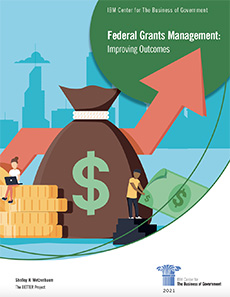
Federal Grants Management: Improving Outcomes

Given the priorities of the Biden-Harris administration and the enormous influx of grant dollars to address the health and economic impacts of the pandemic, this is an opportune time to rethink and reframe how the federal government manages grant programs.
Dr. Metzenbaum argues that the federal grants management system needs to shift from an emphasis on administrative matters to one on improving outcomes, informed by analyses that suggest the right places to focus. She argues further that this will require rethinking the roles and responsibilities of the many diffuse and dispersed players in federal grant and related programs. For example, this would mean identifying “outcome brokers” for every grant program’s objectives. They would be responsible for coordinating and, where necessary, catalyzing efforts that inform where to focus, find ways to improve, and successfully encourage adoption of increasingly effective practices.
Dr. Metzenbaum proposes designating a leader to serve in this role who may work in the grant program or elsewhere, noting that this represents a very different role than the administrative, fiscal, and compliance roles performed by most grant program officials currently identified by the Office of Management and Budget. In addition, designating outcome brokers—and where appropriate, outcome improvement teams—for grant programs would support cross-program collaboration and learning, both to improve grants outcomes and to improve grant efficiency as well as other aspects of operational quality.
Dr. Metzenbaum offers a blueprint to improve grant outcomes both short and long term, offering specific recommendations for multiple participants in the federal grants management system. These participants include federal policy, program, regional, and oversight officials; grant recipients; and nongovernmental allies supportive of program goals.
This report complements an earlier IBM Center report, Reducing Administrative Burden in Federal Research Grants to Universities, by Lisa Mosley, Jeremy Forsberg, and David Ngo.
While this report is targeted to federal policy makers and grants managers, we hope it provides leaders at all levels of government in the U.S. and abroad—and possibly private sector funders— with a useful set of actions they can consider to improve the program effectiveness, cost-effectiveness, and equity of their grant programs, make wiser resource allocation decisions, and operate more seamlessly to serve citizens and their communities.
Read the article in GovExec: "There's a Better Way to Manage Federal Grants, a New Report Shows"




 Federal Grants Management: Improving Transparency
Federal Grants Management: Improving Transparency Federal Grants Management: Improving Operational Quality
Federal Grants Management: Improving Operational Quality